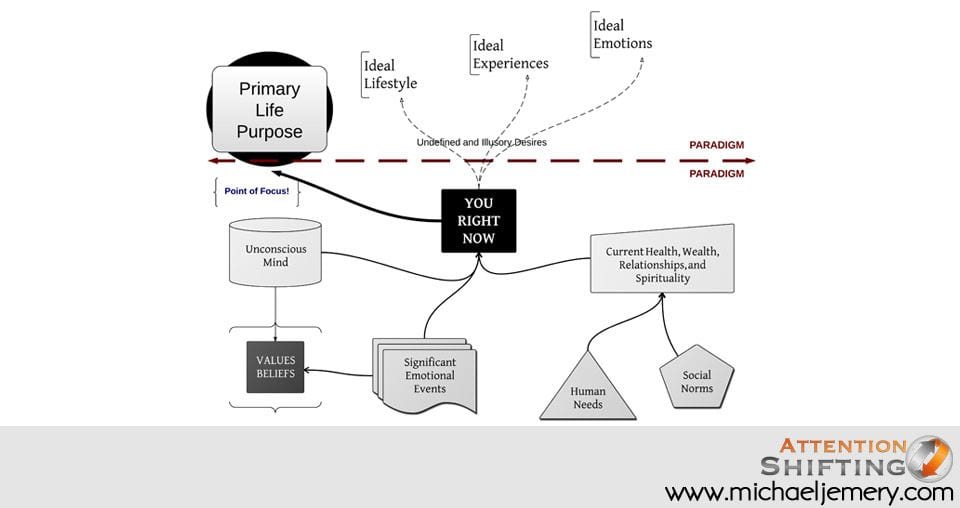
Most people are interested in working with a Personal Development Coach to achieve goals such as:
An effective personal development coach will challenge your paradigm and perceptions in the context of the experiences you desire to have.
You are on the journey of a lifetime, but do you have a map and the resources necessary to arrive at your desired destination?
When it comes to personal development coaching, my belief is that your potency in life is directly related to your purpose.
Having a primary purpose kindles the fires of passion in your being.
Passion is the energy, the fuel that drives you through challenges and into personal success. A personal development coach will hold the space you need to heal the past while developing unique resources for your future.
It practically goes without saying that not all personal development coaches are created equal. Each individual has a unique perspective, attitude, and way of moving through time.
The internet is full of life or personal development coaches, most of which on any given life coach directory or website, are making promises about their approach or how to make your life more balanced, rewarding, or fulfilling.
I personally question this approach. I agree that personal growth is appealing in the sense that the goal of working with most personal development coaches is to hurry up and get to the end outcomes so that one can relax and take it easy...
In reality, in nature, life doesn't seem to function that way. Living is not static. You will never have all the answers, and half the time you won't know exactly what your life goals are because circumstances will change.
Not to mention that many people would actually become bored, apathetic and lazy without challenge. A life coach, self improvement coach or a personal growth coach will empower you with tools to manage your mental and emotional state while enhancing your communication skills. There are the common topics a life coach will go on about like the need to develop self confidence, enhance self esteem, the need for money management, having to cultivate a positive mindset, update limiting beliefs, define personal goals, and enhance your overall personal life.
Even professional development coaches who offer executive coaching advice, and coach people how how to start their own business, excel at public speaking, assume extra responsibilities to create positive changes in the work place, and the importance of the need to start making permanent attitude changes, still have clients who do not have a clear idea as to their respective primary purposes.
The mental images that flash before you when you consider the phrase a fulfilling life are dynamic. What might be good for you today in terms of a career, your social life, your well being, the concept of your best self, your full potential, the right direction for you to go is all highly subjective.
When you go to a gym, you distress your muscles and cause the muscle fibers to tear. When you heal you develop muscle mass and strength. Your life in general is the same. Opposition, challenge, and difficulties are actually what give you the resources you need to fulfill your primary purpose in life.
The client who has a clear purpose innately experiences confidence. Money flows, friends are plenty, and he or she has a positive impact upon the lives of others. Most people live without a meta-direction; an overarching, life-defining cause that gives form and reason to every action.
My perspective is that one’s identity should serve one's primary purpose.
You become the key that unlocks the lock of your particular magnum opus. It is a higher work as found any worthwhile spiritual teaching, and as a personal development coach, I am here to serve you in its unfolding.
The identity of the average person is based upon the lives and opinions of others and personal short-comings. This creates a vicious feedback loop of failure being affirmed by the opinions of others.
Instead, a personal development coach will empower you to discover how to construct and identity based upon your higher purpose in a way that serves what you must become -- not who you once were.
Through technology, a personal development coach can literally work with you anywhere in the world. It is not necessary to be limited to working with a personal development coach in your physical vicinity. Coaching is moving to online/video/phone formats because it is easier for people to coordinate schedules and save time involved in commuting.
Online formats for teaching, personal development life coaching, studying communication skills, receiving executive coaching, discuss problems and opportunties, and working with a self improvement coach are readily available.
Personal development can be achieved alone as a form of self-help, but this often prevent people from becoming aware of their “personal development blind spots” or it keeps them from addressing uncomfortable or painful topics that must be resolved before progress is possible. A personal development coach is someone who has ideally already passed through the challenges you face and has an understanding of the environment and the resources needed to share with you.
If you don’t know where you’re going… then any direction will be just fine, won’t it?
There are infinite possibilities for personal development work and a personal development plan template is just a way to get you started. Ultimately, my goal is for you as your personal development coach to create a process in which you find true personal autonomy.
A personal development plan template just serves as training wheels… and you may quickly outgrow them. As we say in NLP, “the map is not the territory”. A personal development plan template is not an absolute. What I intend for my clients is to use my personal development plan template to get them started and then to personalize it. The following image is an example of a personal development plan that I often refer to with my coaching clients.
I am certain that there are many effective personal development coaches out there often operating under the label of a life coach or life coaches essentially doing the same thing as a personal development coach. But often a life coach is perceived as a novelty service for goal setting and time management. The average life coach may not have the resources you need, as this is a general catchphrase for people to categorize professional coaching, but there are many specializations in the coaching field.
There are dating coaches, there are health coaches, and there are countless other coaches who specialize in various niches.
I personally believe that coaching is a foundational approach to life accomplishments. My approach as a personal development coach focuses upon 3 distinct phases:
1. Resolving past significant emotional events
2. Creating empowering states for the present moment
3. Building your future legacy
Personal development and professional development are strongly intertwined, and I believe that achievement in the personal arena allows for professional success. It is nearly impossible to divide one from the other when establishing personal development goals. My areas of expertise:
Personal development is the process of self-enhancement that can occur individually or under the guidance of a mentor, teacher or personal development coach. The field of personal development is ancient, and history reveals that it is an ongoing area of research and understanding as each generation faces new challenges and opportunities.
As a personal development coach, I recognize that shamans, priests, witch doctors, spiritual and religious leaders, along with philosophers, linguists, innovators, and politicians have also historically embodied elements of the role of a personal development coach. The personal development coach label may change, but the role persists throughout time.
There are a variety of online and in-person learning programs, training materials, books, audios, and videos available on the internet and in book stores. Each of which share different perspectives, tools, techniques, and methods to enhance one’s personal development. There are forums dedicated to a variety of life ocaching topics and life coach training where one can discuss common topics such as career, health, business, and coaching related issues.
The key premise behind personal development is intentionality: the intent to change one’s circumstances or effectiveness based upon specific, measurable criteria. In most activities this affects an individual’s health, wealth, relationships and spirituality.
To begin with, there must be an initial intake using specific criteria to establish "where" one is currently and this is contrasted with one’s desired outcomes. This process reveals the missing resources that the individual must personally develop.
Most personal pain comes from "not having" or "not being". This affects most clients at a personal and professional level. The personal development life coaching process holds a space for the client to objectively identify what is in excess and what is lacking.
The resulting objectives, goals and benchmarks can be used as milestones that demonstrate progress upon a person’s personal development path.
Both failures and successes upon this development path provide a feedback system in real time.
A personal development coach helps the coachee to effectively evaluate the feedback and make adjustments accordingly so as to stay on track.
It is generally assumed that personal development mixed with psychology when Alfred Adler and Carl Jung made their respective impacts upon psychology. Alfred Adler is recorded as one of the first psychologists to not limit psychology to just analysis that focused upon past childhood circumstances or unconscious drives as derived from the Freudian psychotherapy model.
Adler also defined the concept of lifestyle, which is a person’s overall approach to life including how they face problems, their self-image and general attitude toward life. Carl Jung brought to psychology the notion of the process of individuation. This is the individual’s drive to experience a sense of wholeness and internal balance. Later, Daniel Levinson developed a model of seven life stages that has come to be known as the lifecycle. Within the lifecycle, each individual is unconciously influenced by the aspirations of an ideal life; “the Dream.”
David Starr Jordan Professor Emeritus of Social Science in Psychology at Stanford University, Albert Bandura has revealed through his research that personal development is an effective approach to goal achievement because of the internal resources it builds within the individual. One of the primary resources each individual who proactively begins a self-directed personal development path is self-confidence.
Self-confidence, according to Bandura, is an important predictive quality supporting individual success because within the individual it: creates the context of anticipated success; it allows for controlled risks and challenging goals; it encourages continued attempts in the face of failure; and it empowers one to control non-beneficial emotions.
The educational researcher in the field of student affairs, Arthur Chickering, outlined seven import points of personal development that should be experienced by university students:
The application of personal development within the training materials of academia can be seen in the following disciplines:
Maslow’s Hierarchy of Needs reveals self-actualization at the top of the pyramid, signifying a human being’s desire to be more and be everything that an individual has the capacity to become. It is interesting to think that Maslow estimated only a small percentage of the population were actually concerned with self-actualization, individuation and personal development.
The remainder of the population would be solely interested in the lower levels such as financial security and personal needs being met. With the growth and globalization of the world’s economy, it becomes less the responsibility of corporations to ensure the personal development of their employees and more so the responsibility of the employee to ensure she or he is well suited for a position. Peter Drucker stated the following in the Harvard Business Review (source):
We live in an age of unprecedented opportunity: if you’ve got ambition and smarts, you can rise to the top of your chosen profession, regardless of where you started out. But with opportunity comes responsibility. Companies today aren’t managing their employees’ careers; knowledge workers must, effectively, be their own chief executive officers. It’s up to you to carve out your place, to know when to change course, and to keep yourself engaged and productive during a work life that may span some 50 years.
It can be generalized that corporate personal development coaching programs can be divided into two categories: employee benefits and skills development strategies.
The purpose behind employee benefits coaching programs is to enhance motivation, increase employee loyalty, optimize skills, and improve job satisfaction. Such personal development programs focus upon: time management, work and life balance, stress management, leadership, and personal discovery. These are similar personal development life coaching skills that can occur in sports, martial arts, NLP coaching, hypnosis, personal finance, yoga, meditation, etc. Regarding development strategies, these often overlap with professional development goals.
Often programs are created or consultants and personal development trainers brought in to enhance productivity, inspire innovation or motivate employees to enhance the quality of their work. The overall interests benefit the employees but more so benefit the long term development goals of the organization.
In this sense, this corporate approach to personal development life coaching is a win-win scenario because the company can look at enhancing one or all of the following factors: increase performance, reduce costs, or increase revenues. While the employees receive training and resources to better ensure job stability and enhance performance.
There are numerous niches for coaching, but in my perspective, there are typically two major categories: personal and professional coaching. Interestingly, I believe that both overlap as it is nearly impossible to separate one's personal life from one's professional life. Below are common coaching niches that my services cover.

Business coaching helps to cut through distractions, increase your performance, find your focus, define the scope of your role, and pinpoint your reason “why” you’re doing what you're doing.

Executive coaching helps the coachee utilize coaching techniques to facilitate the individual growth of team members while improving workplace performance and goal-achievement.

The role of a life coach is in many ways to be that of a cheerleader or an avatar that keeps you encouraged, motivated and with your primary objectives and goals in mind.

Personal development coaching focuses upon improving self-awareness, create an empowering identity, enhancing one’s quality of life, determining one’s primary life purpose, and developing necessary resources.

Neuro-linguistic programming (NLP) coaching is focused upon self-awareness enhancement, goal achievement strategies, interpersonal communication, and understanding human behavior through flexible, subjective perspectives.

Leadership coaching is primarily focused on helping organizational leaders to gain a solid sense of identity, purpose, motivation, empowering resources, goal setting strategies, and synergistically using coaching to realize one's full potential.